| |
Heather's IBS Newsletter ~ For Irritable Bowel Syndrome
"IBS is just one of the things about me, not the thing that controls me!"
A short & sweet Ask Heather! Is sugar is an IBS trigger?
Plus wild blueberry pancakes made IBS-friendly!
Hello to everyone ~
We have one of my all-time favorite reader letter ever this week! Emily wrote me to say that, amazingly, IBS has had lots of positive effects on her life, and she wanted to share those. I really hope her story will help other readers find the surprisingly good things that can come from such an awful disorder.
We'll also tackle a confusing dietary issue for many IBS folks - is sugar a safe food or a trigger? And why?
Plus, a fantastic digestion-friendly recipe that puts greasy diner pancakes to shame!
As always, we also have the latest IBS news and research. Enjoy!
Best Wishes,
Heather Van Vorous
Did a friend send you this newsletter? Sign up here for your own free subscription.
~ Heather's Tummy Tamers Peppermint Oil Capsules ~
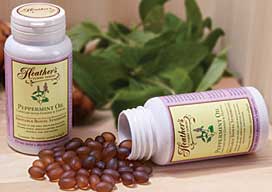
Peppermint Oil Caps Called "Drug of Choice for IBS"
Our Peppermint Oil Caps have the added benefits of fennel and ginger oils, and they help prevent abdominal pain, gas, and bloating!

Wild Blueberry Buttermilk Pancakes Traditional pancake recipes are high fat and full of triggers like egg yolks, butter, and milk. The good news, however, is that these recipes are super duper easy to adapt to the IBS kitchen. By simply using egg whites and no yolks, cooking in non-stick pans, and substituting soy or rice ingredients for dairy, you can have a delicious breakfast treat that's also good for your gut.
Adding small quantities of blueberries to the soluble fiber foundation of the pancakes will give you added nutritional benefits, plus let you safely incorporate some insoluble fiber. The berries also make the pancakes extra scrumptious!
Makes about 10 four inch pancakes
1 tablespoon Acacia Tummy Fiber
1 cup minus 1 tablespoon flour
1 teaspoon sugar
1/4 teaspoon salt
1 teaspoon baking powder
2 egg whites, lightly beaten
1 cup soy milk blended with 1 tablespoon white or apple cider vinegar
1 tablespoon canola or safflower oil
1 cup blueberries, wild if possible
Sift and whisk the dry ingredients together in a large bowl. In a medium bowl whisk the wet ingredients together (do not include the blueberries). Add the dry ingredients to the wet with just enough swift strokes to blend the batter (there will be some lumps remaining). Do not overbeat!
Heat a large non-stick skillet over medium-high heat and test by adding a few cold water drops. When the water drops bounce and sputter, the skillet is ready. Spray skillet with cooking oil, and pour pancakes in. (Most large skillets will hold about 6 pancakes at a time.) Scatter surfaces of pancakes evenly with blueberries.
When the surfaces of the pancakes bubble, turn the cakes over with a spatula. Continue cooking until bottoms of pancakes are golden brown, and serve immediately with maple syrup.
For a breakfast feast, serve these pancakes with a Mushroom, Shrimp and Dill Omelet and a cup of Peppermint Tummy Tea!
Are you just learning how to eat for IBS? A little intimidated at the thought of special IBS recipes? Not quite sure just what makes these recipes special in the first place? Don't worry! Come see the IBS Diet pages, and find the answers to all your questions.
~ Heather's Tummy Fiber ~
For the Dietary Management of Abdominal Pain, Diarrhea, &, Constipation
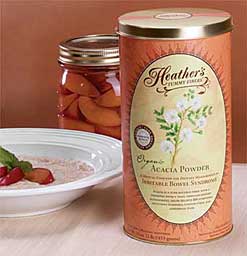
Certified Organic Acacia ~ Pure Soluble Fiber
The prebiotic fiber that relieves both diarrhea and constipation!
** Very Economical ** Only 4 cents per gram of fiber!
 What Good Can Come from IBS?
What Good Can Come from IBS?
Dear Heather,
This is a letter I've been meaning to write for a long time. So many times, people with IBS feel hopeless and overwhelmed - I know I did at the start! - and many people have sympathetically told me that they feel bad for "how hard life must be". And sure, I have my awful days and the times when I don't want to get out of bed, but actually IBS has had lots of positive effects, too. I wanted to share those, simply because thinking about my IBS as a trigger for positive changes helps me a great deal, and I hope it might help some of your other readers, too.
I developed IBS as a senior in college in 2004. It probably would have never been diagnosed (my doctor thought I was just complaining) had my mother-in-law not immediately recognized the symptoms she herself had suffered in her 20s. Thanks to her, I knew what to research and quickly found your site. Simply put, when I finally started following it religiously, the Eating for IBS diet changed my life dramatically. I gained a measure of control over my symptoms, and the longer I've been on the diet, the more control I have and the fewer truly horrendous days I have. So thank you, very much.
Now that I am mostly stable and able to be an active participant in my life again, I've been able to reflect on what good has come out of all of this. In the past four years, I've learned to be much more humble, less focused on presenting a perfect image to the world, and more able to admit my own fallibility without feeling guilty about it.
My different (I don't consider it restricted!) diet has forced me to learn how to cook. Far from being stressful, discovering new recipes and new ways to make safe and delicious things for myself and my family has become a kind of therapy. If I'm in the kitchen, I'm concentrating on something creative and productive, and my worries just melt away. The fact that people on "normal" diets prefer my versions of some dishes to the traditional preparation gives me a real sense of pride.
In addition, I'm now really attuned to the contents of my food. My husband and I love shopping together at our local greenmarket, and we've gotten picky about organic, sustainable and fair trade products. We've really grown together as we've learned how to deal with my condition.
What's more, IBS has made me more physically fit. I discovered that I feel much better when I'm active, so I joined a gym and started going regularly, working up to three or four 60 minute runs a week and three sessions of weight training. I've lost 20 pounds, which has itself done wonders for my confidence.
The third aspect of my life that's been improved because I've had to deal with IBS is my psychological health. In order to reduce my stress (a major trigger), I've had to confront issues that have plagued me for years. In learning to face those things and find other channels for my emotions instead of just bottling everything up, I'm turning into a much easier person to live with...though I'm sure my husband would say I still have my days!
It seems a little ironic, but because of my IBS, I've developed habits that will probably make me healthier and happier for the rest of my life. Recently, a new doctor told me that she thinks of IBS as just "a way of being" instead of an illness - like having sensitive skin or poor eyesight. I think I agree with her - now I've learned to live with myself, IBS is just one of the things about me, not the thing that controls me.
Thanks again,
Emily Hanson
Thank you from the bottom of my heart, Emily! Your story conveys exactly what I hope everyone with IBS will end up feeling! ~ Heather
Did you miss the last reader letter from Judy, a follow up to the IBS story too embarrassing to print?
~ Eating for IBS ~
Comprehensive IBS Diet Information & Safe Foods vs. Trigger Foods
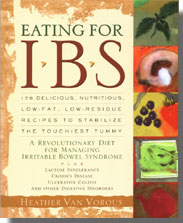
Addresses multiple IBS symptoms * Teaches substitution, never deprivation
Finalist for the Julia Child cookbook award!
 Role of Fructose in Initiating IBS Symptoms
Role of Fructose in Initiating IBS Symptoms
A recent article in Clinical Gastroenterology & Hepatology noted that observational studies suggest dietary fructose restriction might lead to sustained symptomatic response in patients with irritable bowel syndrome (IBS) and fructose malabsorption. This double-blinded, randomized, quadruple arm, placebo-controlled rechallenge trial took place in the general community. The 25 patients who had responded to dietary change were provided all food, low in free fructose and fructans, for the duration of the study.
Study results showed that 70% of patients receiving fructose, 77% receiving fructans, and 79% receiving a mixture reported symptoms were not adequately controlled, compared with 14% receiving glucose. Similarly, the severity of overall and individual symptoms was significantly and markedly less for glucose than other substances. Symptoms were induced in a dose-dependent manner and mimicked previous IBS symptoms. The study concluded that in patients with IBS and fructose malabsorption, dietary restriction of fructose and/or fructans is likely to be responsible for symptomatic improvement.
Go here for full information about dietary triggers and dietary management of IBS symptoms.
Go here for more information about this article...
Irritable Bowel Syndrome: an International Study of Symptoms
A recent report in the European Journal of Gastroenterology & Hepatology presented a preliminary comparative study of irritable bowel syndrome symptoms in eight countries: USA, Mexico, Canada, England, Italy, Israel, India, and China. It also assessed global symptom patterns and correlations and relationships to several psychosocial variables. The study results showed that pain scores in Italy, with the least urban population, was significantly higher than six of the seven other countries, whereas it was lowest in India and England. Bloating was highest in Italy and constipation was highest in Mexico, both significantly higher than five other countries. Diarrhea was higher in China than five other countries.
Globally, diarrhea was less common than constipation, and bloating significantly correlated with constipation as well with pain. Pain, bloating and diarrhea were significantly attributed to physical etiology, whereas only diarrhea was attributed to emotional cause. The study concluded that there are significant variations in irritable bowel syndrome symptoms in different geographic locations around the world. Various hypotheses that may explain the data are: cultural beliefs, gut contamination, urban and rural location, dietary practice, and psychosocial factors.
Go here for full information about IBS symptoms, diagnosis, and treatments.
Go here for more information about this article...
Researchers call gut-directed hypnotherapy a "cure" for IBS!
The Best Gut-Directed Self-Hypnosis Program for All IBS Symptoms
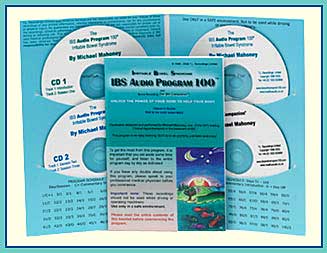 
Gives an average 85% reduction of pain and bowel dysfunction symptoms.
Listen to IBS Audio Program 100 samples!
 Sugar and IBS Sugar and IBS
Is sugar safe for IBS, or is it a trigger food?
Just like the answer to this question about wheat, which we tackled last time, the answer this time is also, "it depends."
When most people ask about sugar, they're thinking of refined white granulated, powdered, or brown sugar. These are the plain old baking and cooking sugars you buy at the grocery store and use in home cooking.
All of these sugars are sucrose, and sucrose is not an IBS trigger. Refined sugar is certainly not a health food, but it isn't a GI stimulant or irritant, which means that IBS-safe dessert recipes simply depend on a low fat, dairy-free, high soluble fiber foundation. The sugar itself won't cause problems, so feel free to enjoy some sweet treats.
However - another type of sugar, fructose (fruit sugar) is a very likely trigger for IBS symptoms, especially diarrhea, gas, bloating, and cramps. Fructose is a naturally occurring simple sugar, and is found in particularly concentrated amounts in commercial drinks and sweets made with high-fructose corn syrup and fruit juice concentrate.
It is actually possible to be fructose intolerant (your doctor can - and should - test you for this). But, even people without fructose intolerance can suffer GI side effects from this sugar.
To avoid fructose, carefully read commercial food labels for the words: corn sweetener, corn syrup, high-fructose corn syrup, fructose, levulose, and invert sugar. About 40% of the sugar in honey is fructose, so if you're fructose intolerant you may have to limit this, too.
Fructose accounts for less than 10% of the weight of much fresh fruit such as strawberries, bananas or apples. So, please don't eliminate all fresh fruits from your diet, as you need their nutritional benefits. However, dried fruit and fruit juices are far more concentrated sources of fructose, and you might have to restrict them, at least to some degree.
If you find yourself faced with eating more fructose than you're confident will be safe, make sure to take your soluble fiber supplement first. This will at least give you an added measure of safety and help keep your gut calm.
~ Heather
Did you miss the previous Ask Heather and is wheat safe for IBS - or not?
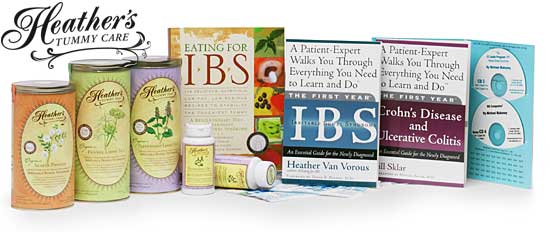
Shop at Heather's Tummy Store for IBS
HelpForIBS.com
The only store that's just for IBS - so we only carry the very best

You're on this newsletter list because you have expressed interest in IBS news and information.
Change your newsletter email address here.
If you are viewing this newsletter on a website and would like to subscribe for email delivery, please "Join the IBS Newsletter" here.
ANTI-SPAM PRIVACY & SECURITY POLICY
HelpForIBS.com
Heather's Tummy Care
80 S. Washington St, #304
Seattle, WA 98104 USA
© 2008 Heather Van Vorous, Heather's Tummy Care. All rights reserved.
USA Copyright Office Registration Number TXU 1-270-858 and others
|
|
|